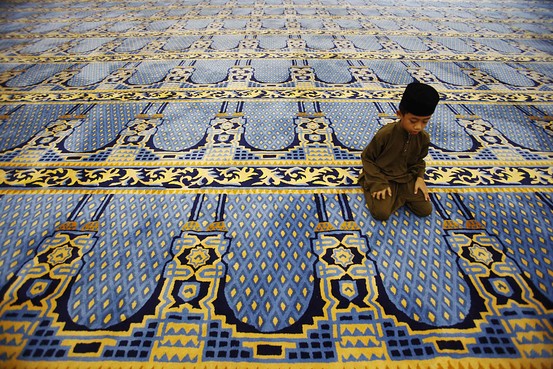
A Muslim boy performs a prayer at a mosque in Pekan, in Malaysia’s central state of Pahang, on April 19.
What does it matter how you dress?
Well one state in Malaysia cares, at least for those who are Muslim.
The Pahang state in Malaysia’s east coast has outlawed “cross dressing” by followers of Islam. It vows to charge Muslim men or women that it perceives wearing clothes of the opposite gender. The punishment is up to one year in prison.
The law only applies to Muslims in the Pahang state.
It is the latest sign of increasing Islamization in the multi-ethnic Southeast Asian nation, which is often viewed as a model moderate Muslim country by the West.
Each of the 13 Malaysian states has its own religious laws and moral guidelines governing Muslims–ranging from strict dress codes to ban on alcohol consumption–and enforcement is left under state’s purview.
The Quran doesn’t specifically address cross dressing, but urges its followers to dress modestly.
“We couldn’t take any action before this. We want to make sure it does not become more widespread,” Wan Wahid Wan Hassan, deputy president of Pahang Islamic Religious and Malay Customs Council, told The Wall Street Journal.
The state’s Syariah Criminal Offenses Enactment of 2013 states that any “man behaving like women” or “woman behaving like man” is punishable by 1,000 ringgit ($304) or one-year jail or both. The list of Islamic crimes under the latest enactment runs up to 50 offenses, including spreading “false doctrine” which is punishable by a fine as much as 5,000 ringgit, three years jail, six whippings, or any combinations of such punishment.
“We don’t want any immoral activities here, and we will make sure enforcement officers will have this additional duty when they go out on their routine checks around the state,” Mr. Wahid said. The council’s main role is to advise, while enforcement is left to the Pahang Islamic Religious Department, he added.
Nizam Bashir, a syariah lawyer, said there is a desire in Islam to ensure “a clear demarcation” in terms of sexuality and sexual expression.
“Beyond the Quran, everyone is guaranteed under Malaysian constitution to freedom of speech and expression. Attire is part of expression and it’s a fundamental liberty that the state legilsative may have encroached,” Mr. Nizam said.
Raids by Islamic authorities–mostly for “close proximity” offenses between unmarried Muslim couples–are regular news items in local media. Muslims make up about 61% of the 28 million population.



Leave a reply